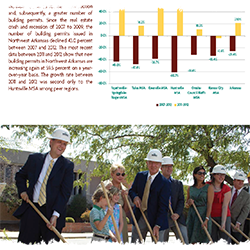Click to view the 2013 State of the Northwest Arkansas Region Report
The Northwest Arkansas Council and the University of Arkansas’ Center for Business and Economic Research recently released the 2013 State of the Northwest Arkansas Region Report, which highlights key economic performance factors in the region and also compares the Northwest Arkansas region to selected peer regions. Key economic factors and quality of life indicators measured include Return to Long-Term Growth, Employment, Establishment Growth, Cost of Home Ownership and Living, and Personal Income, among others. The Metropolitan Statistical Areas (MSAs) used as peer regions were Omaha-Council Bluffs, Kansas City, Knoxville, Tulsa, and Huntsville.
Overall, the Northwest Arkansas region compares very favorably to the peer regions and is ranked as having the lowest Cost of Living and the lowest Violent Crime rate among the peer group. The report indicates that the Northwest Arkansas region has made a very good recovery from the 2008-2009 recession and, with regards to most economic factors, has even surpassed pre-recession conditions. Almost 8,000 jobs were lost during the recession, but since 2010, 10,000 jobs have been added in the region, helping to bring the area’s unemployment rate down to 5.6% in 2012, well below the 2012 national rate of 8.1%.
The increase in employment opportunities and job creation has once again caused a significant increase in the Annual Building Permit Growth Rate. From 2011 to 2012, the year-over-year increase in building permits was 59.5 percent, second only to the Huntsville (AL) MSA. In addition to single-family and multi-family dwelling construction, the construction of office buildings, academic facilities, and a variety of other projects has also contributed to this increase in building permits.
While the recent increase in construction activity has yet to trigger the volatility in the materials and labor markets that was so common prior to the recession, our staff of estimating professionals is continuously monitoring market activity in order to anticipate and address any changing trends in the marketplace.


